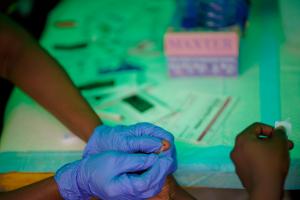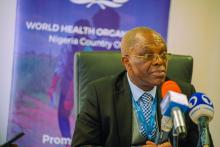Stakeholders take on malaria, top killer disease with innovative tools
Abuja, With Nigeria still accounting for 27 percent of global malaria cases and 31 percent of global malaria deaths, relevant stakeholders, including the World Health Organization (WHO) reiterated to support the government to combat the effects of malaria in the country.
Malaria is endemic in Nigeria and 32 years old Toyin Obasola and her family of six residing in Ibadan, Oyo State, Southwest Nigeria, is part of those who regularly fall ill from the disease.
“The infection seems to transfer from one person to another in the family. Anytime we feel a headache, feverish, or vomiting, and go to the health centre for tests, it usually turns out to be malaria.
Buying antimalarial drugs is not cheap. It became embarrassing because the health workers in my locality already knew my family. Malaria is the major ailment we treat, which is why I believe that there is something in my community that mosquitoes like, says Mrs Obasola, a mother of four.
For Mrs Obasola and her household, treating malaria almost became a pass time until she took the advice of a health worker who taught her to sleep inside insecticide-treated mosquito nets, including using other protective mechanisms like wearing long sleeves and covering all water pots and storage tanks to prevent the mosquitoes from breeding in them.
“Since my children started sleeping inside the nets, their malaria episode has reduced. I heard of insecticide-treated mosquito nets before but did not use them because people say it generates heat. Malaria is a preventable disease. It is transmitted by the female anopheles mosquito and killed an estimated 619 000 people globally in 2021.
Unfortunately, the African continent, which Nigeria is part of, is home to 95% of malaria cases and 96% of malaria deaths. Children under five accounted for about 80% of all malaria deaths in the region.
The 2022 World Malaria Report indicates that Malaria cases continued to rise in 2021, but at a slower rate compared to the period 2019–2020: cases stood at an estimated 247 million in 2021, 245 million in 2020, and 232 million in 2019 respectively.
With malaria being one of the deadliest diseases globally, the World Health Organization (WHO) and its partners have been devising various strategic tools to solve the problem. One of them is the use of insecticide-treated nets.
“We advise people especially mothers and pregnant women to prevent infection by mosquitos sleeping under insecticide-treated nets, for pregnant women, to take intermittent preventive treatment in pregancnay from their 2nd trimester, get tested for malaria before using antimalarial drugs and to keep their environment clean to prevent mosquito breeding areas, says Mary Yarda, a nurse at a private health facility in Abuja with 15 years of work experience.
“We advise people not to self-medicate but get tested before treatment. The diagnosis and treatment of malaria has evolved over the years. We now use rapid Test Diagnosis (RDTs) kits for malaria screening, in addition to the microscopy.
This allows for quick results for malaria tests before treatment because the waiting time has also been reduced, she says,
To mark the 2023 World Malaria Day, the WHO Nigeria Representative Dr Walter Kazadi Mulombo, says it is time to rethink and revitalize our strategies by investing, innovating and implementing smartly to eliminate malaria.
Reading the WHO Regional Director's message during a media roundtable in Abuja, Dr Mulombo says “World Malaria Day allows us to renew political commitments and bolster investments in malaria prevention and control.
He calls on Member States to redouble their commitment to implement an ambitious and innovative acceleration plan to rapidly reduce the burden of malaria and save the lives of its populations.
“To achieve this, Governments need to mobilize more resources and technical capacities at domestic and international levels and build effective partnerships and multisectoral mechanisms to help strengthen preventive measures and improve coverage of malaria case management services, he says.
To limit the transmission of malaria, WHO has been supporting the government of Nigeria and its other partners at the federal and state level to implement various malaria control/elimination programmes across the country.
For Instance, WHO has been supporting the National Malaria Elimination Programme (NMEP), to strengthen malaria surveillance, drug and insecticide resistance monitoring, advocacy and resource mobilization, data use and evidence generation, capacity building, service delivery including delivery of ITNs, diagnosis and traetament, seasonal malaria chemoprevention, Intermittent preventive treatment in pregannct women etc.
Likewise with funding from the Global fund and President’s Malaria Initiative, WHO is supporting Seasonal malaria chemoprevention in Adamawa and Yobe states, IDP malaria control in Adamawa, Gombe, Taraba and Yobe states and technical assistance to strengthening malaria prevention, diagnosis, treatment and surveillance.
World Malaria Day is commemorated on 25 April every year to raise awareness about the deadly disease. The theme for the 2023 World Malaria Day is Time to deliver zero malaria: invest, innovate, implement. The National slogan for the 2023 WMD is Act Now!
Technical Contact:
Dr Lynda Ozor; Email: ozorl [at] who.int (ozorl[at]who[dot]int)

